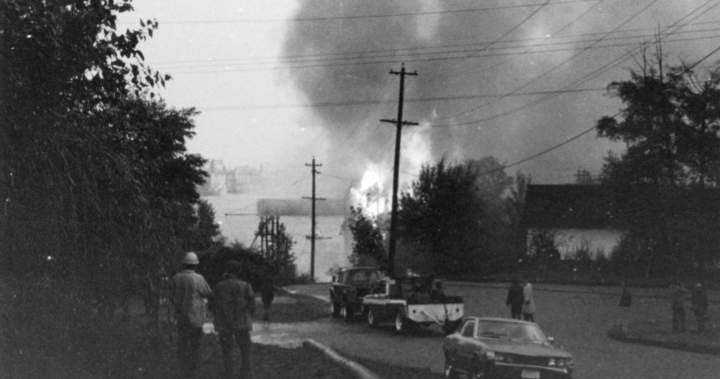Oct. 3, 2025, marks the 50th anniversary of one of the biggest and deadliest industrial accidents in Metro Vancouver history.
On Oct. 3, 1975, a fire and two explosions at the Burrard Grain Terminals in North Vancouver killed five men and severely burned 12 others.
“Anyone that was old enough and around will remember that day,” Mike Kalanj told Global News.
His dad, of the same name, was one of the workers at the terminals who survived but was burned over 55 per cent of his body.
The second explosion at the site was caused by grain dust, which can be 35 times more explosive than TNT. Nearby homes had to be evacuated as large pieces of charred wood rained down on the houses.
At the time of the accident, Kalanj’s mother was in the hospital, about to give birth to him and his twin brother.
“She was in there for a few days when the explosion actually happened,” Kalanj said.
“After the explosion, they sat my mom down and they wouldn’t let her look out the Vancouver General window because it faced north and you could see the smoke from there in the North Shore. So they sat her down and two days later, emergency C-section, my brother and I were brought into the world.”
At the time, Kalanj said his mom didn’t know what her husband’s future would look like, but his dad was released from hospital about six weeks later.

Get daily National news
Get the day’s top news, political, economic, and current affairs headlines, delivered to your inbox once a day.
Local media, including BCTV, covered the explosion and Kalanj said it became part of their family’s history.
According to the International Longshore and Warehouse Union Canada, the call first came in in the morning as a fire and two explosions quickly followed.
At the time, there were 26 people working at the grain elevator and one person became trapped in the building. His body was never found.
Kalanj said that when his father recovered, he went back to work at the terminals because it was a good-paying job.
“The injuries, the physical injuries, they were just physical injuries,” Kalanj said.
“You know, it was 1975. It was very clear. It’s very clear now anyways that my dad had some pretty heavy PTSD that no man in the ’70s or ’80s is ever going to talk to someone about.”
Kalanj said he saw his father deal with a lot over the years, including working more than 30 years at a place that almost took his life.
“He struggled a lot. He definitely struggled a lot mentally. Most people didn’t see it because he kept it in, but he’s a tough old man.”
Kalanj’s father passed away almost 12 years ago.
“For decades, we talked about this day in 1975,” he said.
“And I realized the other day that we didn’t talk about details. We didn’t talk about the finer things. But I think in the ’70s, my dad walked in there without a high school graduation, got a union job, was being paid well.
“So he went back, I think, because he knew he had a good wage and the union really treated him great. So did the company. And he knew we could raise a family with a job on the waterfront. So, you know, it was a good job. They weren’t a dime a dozen at the time, right? In 1975.”
Read the full article here
